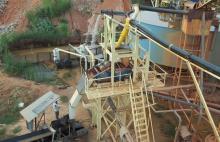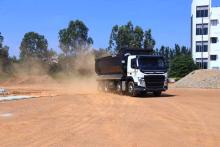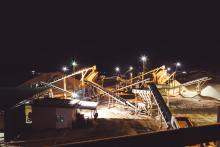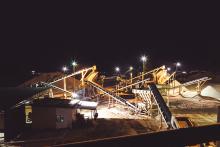As the world’s second biggest consumer of aggregates and with its estimated aggregate demand of 5.5 billion tonnes, India offers aggregate and other building material product producers a wealth of commercial opportunities. However, not all are currently able to benefit from the booming market. Guy Woodford and Partha Pratim Basistha report.
India is second only to China in its consumption of aggregates. Demand for construction equipment goes hand-in-hand with demand for aggregates, given the need for raw materials to complete new infrastructure projects. As such, the findings of Global Construction 2030, a key publication from Global Construction Perspectives and Oxford Economics, showing that India’s construction market will grow almost twice as fast as China’s to 2020, becoming the world’s fastest growing construction market to 2030, will be warmly greeted by aggregate producers nationally and leading global suppliers.
Off-Highway Research (OHR) reports that the Indian construction equipment market remains strong, with preliminary OHR data revealing 10% year-on-year sales growth in 2017, following an impressive 36% rise in 2016. A 10% rise to 57,745 units in 2017 saw the market top the previous record annual high of 54,605 machine sales posted in 2011.
The
Metso Park in Alwar, Rajasthan, north India, is a US$33.5 million site that reflects Metso’s major presence in the Indian market. The global construction, quarrying and mining equipment giant is another player which sees India as a key driver of global construction equipment demand for many years to come.
As
According to the National Highways Authority of India (NHAI), 831 projects spanning a length of 67,446kms are in the pipeline (announced and under bidding process). The Indian government set up a completion target of 15,000km of new roads during 2017-18. The uptake of engineering, procurement and construction (EPC) is likely to increase. Newer financing models such as toll-operate-transfer (TOT) and hybrid annuity model (HAM) have been attracting substantial interest in India’s road sector, speeding up projects and driving demand for equipment and raw building materials.
Writing in a recent GAIN (Global Aggregates Information Network) newsletter, Ramesh Bhatawdekar, international research associate at the University of Technology, Malaysia, also highlights the exciting aggregate supply opportunities provided by some of the massive new infrastructure projects being carried out in India over the next few years.
The Sagarmala project is the US$188 billion development of all Indian ports to enable the faster movement of goods. The Bharatmala project includes a new $2.2 billion 5,000km Gujarat-Mizoram road. A further $3.4 billion is being spent on the Mumbai Trans-Harbour Link (MTHL) and the Shivaji Memorial project, which will create India’s longest sea bridge at 22.5km along with a monument to honour the 17th century Indian warrior king and founder of the Maratha Empire, Chhatrapati Shivaji Maharaj. The $7.9 billion Setu Bharatam project aims to make all national highways free of railway level crossings by 2019. Bhatawdekar also notes that India will be spending a staggering $63 billion on 100 airports in tier 2 cities over the next 15 years.
On another note, Bhatawdekar says India’s importation of sand from Malaysia and Cambodia raises hopes of finding new solutions to the river sand crisis in the southern Indian state of Tamil Nadu. He says the first consignment of 55,000tonnes of river sand from Sungai Pahang Port in Malaysia to Chennai, Tamil Nadu, was received in September 2017. Many metro cities utilise Malaysian sand for construction purposes, he explains.
Rising aggregate and construction equipment demand is great news for the next bauma CONEXPO INDIA exhibition taking place 11-14 December 2018. The fifth edition of the international trade fair for construction machinery, building material machines, mining machines and construction vehicles will take place at the HUDA grounds in in Gurgaon, near New Delhi. The previous
India celebrates 75 years of independence in 2022, and the Indian Construction Equipment Machinery Association’s (ICEMA) new report, Building India @75 – A Report on Indian Construction Equipment Industry is another source that captures the wealth of sales opportunities available to aggregate producers and construction OEMs. It highlights how India is likely to become the third largest economy in the world on a nominal GDP basis. In a summary of the key issues covered in the new report, ICEMA says: “Apart from ongoing works, the [Indian] government has announced a slew of public construction projects in roads, railways, metro rail, mining, irrigation, power and smart cities. These are the sectors of interest for the Indian construction industry, which, after a downturn in 2012, has bounced back to earlier levels in 2016-17.”
ICEMA says there are issues around the impact of formalisation of the economy after initiatives like the late 2016-implemented demonetisation, which the government claimed would curtail the shadow economy and crack down on the use of illicit and counterfeit cash to fund illegal activity and terrorism.
The ICEMA report summary continues: “Export levels and absence of large scale private investments are some areas of concern. There are a number of state level elections leading up to the 2019 general elections with its attendant challenges.”
Dilip Buildcon, a hugely successful India-based, private sector road building-focused firm, is a national big hitter set to benefit from the increasingly buoyant Indian construction and aggregates market.
Such has been Dilip Buildcon’s focus on and expertise in road building over the past 14 years, the firm has grown to become the largest private sector, road-focused engineering procurement construction (EPC) company in India, employing 24,000 people and posting a 2016 turnover of 5,000 crore ($776mn). Around 90% of company business is road building, and Dilip Buildcon’s current order book is reportedly worth more than 19,000 crores ($2.95 billion), including roadbuilding projects in 17 Indian states.
“We are getting near to being a US$1 billion [annual turnover] company,” said Devendra Jain, Dilip Buildcon’s CEO and executive director, in an interview last year with Aggregates Business International. “I think we will do that in 2018 or 2019.”
Robust demand for aggregates fuelled by India’s road infrastructure projects is creating a surge in demand for crushing and screening solutions along with other equipment across the value chain involving excavators, wheeled loaders and rigid dump trucks. Demand for solutions for aggregates processing are from quarry owners and also from cement plants, upgrading their processing capabilities.
India is the second largest producer and consumer of cement at 270 million tonnes. Most of the demand comes from the housing and infrastructure sector. India’s total installed cement production capacity stood at 420 million tonnes in 2016-17. Between 2012-13 and 2016-17 production capacity grew at a compound annual growth rate of 4.7%. There were certain aberrations in demand due to the liquidity crunch on account of demonetisation.
Buoyed by robust aggregates demand, equipment manufacturers in India have been busy engineering new solutions that ensure cost-effectiveness and higher levels of productivity. Puzzolana, an Indian crushing and screening manufacturing major, recently introduced 400tonnes/hour cone crushers for manufactured sand applications.
“We have three foundries for our mineral processing business, and we continually do research and development on improving the metallurgy of our crushing and screening plants, in order to reduce their wear and tear,” said Abhijeet Pai, president of the Puzzolana group. “Our manufacturing facilities together can produce forty crushing plant a month,” he added.
Based in southern India, the Puzzolana group recently entered into a distribution tie up with Tata International to promote its 120-600tonnes/hour stationary and 250tonnes/hour diesel electric track plant in African markets.
Another Indian fixed crushing and screening manufacturing major, Propel Industries, has recently launched tracked jaw, cone and screening solutions. “Our new up to 400 tonnes/hour dual powered TMJ 811 single toggle jaw crushers, dual powered up to 300tonnes/hour TMC 250 modular cone crushers and TS 1550-3 screening solution with 1500mm x 500mm screen box are powered by engines coupled with an alternator producing electric power. This helps drive the motors, making power transfer more efficient. It also makes the machines more fuel efficient, reduces maintenance and delivers higher productivity with zero hydraulic issues,” said Senthil Kumar, managing director of Propel Industries (Propel). The tracked solutions are being made at Propel’s new manufacturing facility at Coimbatore in the South Indian state of Tamil Nadu.
Time-bound projects and national government restrictions on extracting sand from traditional river sources are expected to create far greater demand for manufactured sand in India. “There are perennial issues of inconsistent supply of river sand in India at present, especially during the monsoon periods, which delays construction. Producers of manufactured sand can offer consistent supply from production facility directly to the job site, removing the supply constraints and meet the desired specifications. Most importantly, it will reduce consumption of cement in projects by 5-10%. This will curtail the cost of construction, a major requirement of project developers and contractors, while keeping the quality of construction stable,” said Manish Bhartia, managing director of
Sound foundations for demand are likely to create higher business opportunities for plant and machineries manufacturers. However, newer regulations may stifle equipment sales. “Orders booked by crushing plant owners for wheeled loaders and excavators during November 2017 have been put on abeyance after the Bihar State government imposed a ban on all the state’s quarrying and crushing activities from December 2017. Prior to that, the east India state’s government had strictly banned river bed mining. The ban was imposed in order to fully regulate crushing activities in the state,” explained Sunil Tiwari, director of Haritech Enterprises, dealer for
Tiwari added: “Movement and take-up of aggregates has also been hit as the government has completely taken over their procurement. It has now decided to undertake online e-selling of aggregates to prevent pilferage of royalty by the crusher owners and transporters.”
Bihar has four major crushing clusters, known for their higher quality aggregates. The quartet meets the entire demand for aggregates in Bihar, and partly caters for demand in Uttar Pradesh, a state in north India. Bihar State is undertaking major infrastructure projects, including a recently awarded 1,000km state road network. However, with the restrictions on aggregates sourcing, processing and supply, the pace of projects is likely to slow down.








